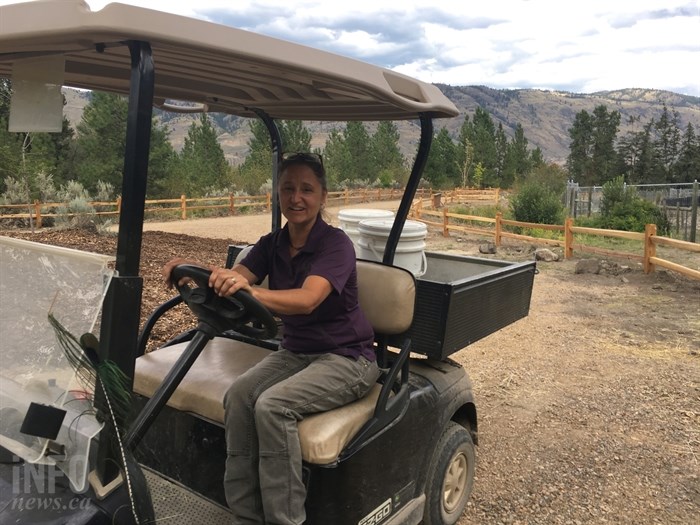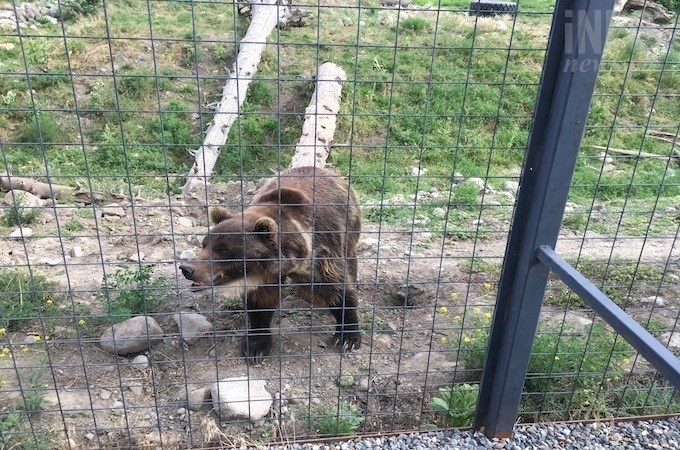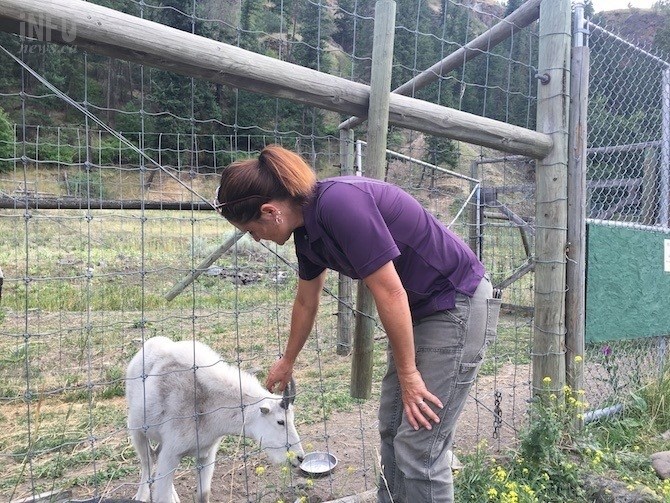
B.C. Wildlife Park Animal Care Supervisor Tracy Reynolds on Thursday, Aug. 1, 2019.
(KAREN EDWARDS / iNFOnews.ca)
August 08, 2019 - 6:00 AM
KAMLOOPS — Take a walk to the wild side and check out the various species at the B.C. Wildlife Park located in Kamloops.
From cougars, wolves, camels, bison, bears, various birds and more —the B.C. Wildlife Park has several different animals that are uniquely different from the next. It’s one of the only zoos in the Southern Interior with a wide range of creatures that was founded in the 1960s and also added a rehabilitation centre to help injured animals.
The Fawcett Family Wildlife Health Centre is a specialized wildlife hospital that has seen up to 300 animals since it opened in the 1990s, and quite often that is where the park’s animals come from, according to the park's animal care supervisor Tracy Reynolds.
“I would say 80 per cent of what we have here is from our rehab department," Reynolds says. “Almost everything we release and we only keep it if we have the space physically and if that animal seems like it is going to be happy in captivity.”
Right now, the rehab facility has nearly 30 animals seeking care. Some of those animals include baby ducks, herons, eagles, and owls, but they don't take in all animals.
“We can’t take bears, cougars, or deer,” she says. “With bears and cougars they are dangerous animals and they can’t get habituated to people and we don’t have the authorization to rehab them under our permits.”
The bears and cougars that live at the zoo currently are there because they were orphaned, Reynolds says.

One of the bears at the B.C. Wildlife Park on Thursday, Aug.1, 2019.
(KAREN EDWARDS / iNFOnews.ca)
With deer, they become too tame around humans and can become problematic.
“We have a couple a deer at the park from our rehab centre and when we would release them they would wander into peoples’ yards and their house so I thought we aren’t doing this right so in order to not do it we aren’t rehabilitating them to make them wild animals, we are just letting out these tame deer,” she says.
The rehab centre also won’t take in introduced or pest species such as starlings, crows, bullfrogs, or raccoons.
“Anything that has been introduced to the area that isn’t supposed to be here we can’t and won’t take,” she says.
The wildlife park is also a member of the Canadian Association of Zoos and Aquariums, meaning they are inspected every four years to make sure they are meeting standards and requirements set up by the association. They look at everything from housing, diets, sanitary conditions, accounts and record-keeping and the medical records.
“Lots of people don’t want that accreditation because it's not easy (to get),” she says.
The wildlife rehab also relies heavily on donations, Reynolds says.
“There is no money in rehab ever we just do it as a public service and the money we bring in through the front door helps support the rehab,” she says.
The wildlife park is currently raising funds for an X-ray machine that would cost approximately $40,000 for a used one and would help save the park save money.
“An X-ray for us each time we go is $60 to $100 bucks just get it done,” she says.
The park is about two-thirds of the way towards its goal.
Reynolds says she is currently in the process of adding to the park's animal collection by getting the wildlife park back into the species survival program. The park hopes to welcome two Asian horse species from Mongolia.
“They are the last wild horse and I think they have been pretty much critically endangered in Mongolia so now they are breeding them in zoos across the world and reintroducing them back into the wild,” she says.
Reynolds says they are hoping to receive a male and female horse within the next year if everything goes as planned. They are also looking to get a mink and marble foxes from a zoo that was recently shut down by the humane society in Quebec.
Anyone looking to donate or visit the B.C. Wildlife Park can visit their website by clicking here.

Animal care supervisor Tracy Reynolds pets mountain goat Gustav on Thursday, Aug. 1, 2019.
(KAREN EDWARDS / iNFOnews.ca)
To contact a reporter for this story, email Karen Edwards or call (250) 819-3723 or email the editor. You can also submit photos, videos or news tips to the newsroom and be entered to win a monthly prize draw.
We welcome your comments and opinions on our stories but play nice. We won't censor or delete comments unless they contain off-topic statements or links, unnecessary vulgarity, false facts, spam or obviously fake profiles. If you have any concerns about what you see in comments, email the editor in the link above.
News from © iNFOnews, 2019